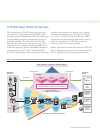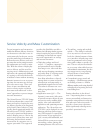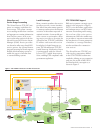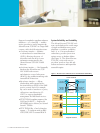
Alcatel-Lucent 5750 Subscriber Services Controller 10
Alcatel-Lucent 5750 SSC can there -
fore offer a full implementation of the
a2, e2 and e4 interfaces in the NASS.
IEEE 802.1X EAP/RADIUS SUPPORT
The Alcatel-Lucent 5750 SSC
enables the authentication and
configuration of user devices such
as RGs that require EAP and 802.1x
wireless access points such as WiFi.
Legitimate RGs can be preconfigured
with a certificate that is authenticated
via the Alcatel-Lucent 5750 SSC
prior to authorizing access at the dig -
ital subscriber line access multiplexer
(DSLAM) or aggregation node.
RADIUS AAA SERVICES
Legacy HSI-infrastructure consoli -
dation and migration to Alcatel-
Lucent’s TPSDA is supported using
a fully featured, highly scalable and
extensible RADIUS authentication
server, with support for standardized as
well as multivendor RADIUS attrib -
ute configuration on legacy BRAS
systems. RADIUS support includes
change of authorization (CoA) for
mid-session policy changes, to facil -
itate dynamic bandwidth man gement
and on-demand service upgrades.
INTEGRATED DHCP SERVER WITH
STANDARDS-BASED INTERFACES
The DHCP server allows the manage -
ment of IP address pools and can, with
the Alcatel-Lucent 5750 SSC, per -
form policy-based authentication, IP
address assignment, and subscriber-
profile configuration based on DHCP
options 82 and 67. The system keeps
track of IP leases for established sub -
scriber and service sessions using a high-
speed, real-time database that can be
replicated over redundant servers.
The Alcatel-Lucent 5750 SSC can
also interwork with existing DHCP
servers in relay mode and is fully
capa ble of fulfilling the role of net -
work access configuration function
(NACF), as defined in the ETSI
TISPAN architecture standards.
A built-in a2 reference interface
allows subscriber information to
be shared with third-party systems
or complementary Alcatel-Lucent
TISPAN/IMS products. A functional
enhancement is available for the
DHCP server module, enabling it
to provide the connectivity location
function (CLF) with support of the
e2 and e4 reference interfaces. The


















